Blog | Social Press Kit
View More ArticlesLaughter is the Best Medicine: 5 Companies that Answered Crisis with Light-Hearted Humor
Today, with the watchful eye of the media on the lookout for any news, especially drama and crisis, it is imperative for businesses to be prepared for any blunder, whether it be caused by their own mistake or the social climate. The staples of good crisis management include a prompt response, appropriate attribution or acceptance of blame with a sincere apology, and action with continued transparency. Depending on the level of scandal and the personality of the brand, the tone and approach of the crisis management can vary, from serious to humorous.
As they say, laughter is the best medicine, and can actually work out brilliantly in the case of certain moments of PR crisis. Humor helps distance the crisis from the peoples affected and brings a new perspective to the situation, making it more controllable. Successfully using humor in a crisis can not only calm angered parties, but also reach audiences not even affected by the crisis and result in positive press. The following are five examples of companies that successfully used humor while they faced varying degrees of crisis.
Taco Bell: Tacogate
In February of 2011, Taco Bell found itself in a beef (excuse the pun) with a law firm
in Alabama. A former employee accused Taco Bell of false advertising because their “seasoned beef” included oats as a filler according to lab results. Taco Bell was very active in their immediate response, defending the quality of their product. Because the case had a more serious tone to it, Taco Bell utilized both serious tweets and posts, but also used humor to calm their customers by tweeting link to Stephen Colbert’s report on “Taco Gate.” Additionally, it took a satirical approach to the crisis when it published full-page paid for ads exclaiming “Thank you for suing us” and “Would it kill you to say you’re sorry?” The ads included statements that the accusations were false and transparency regarding the company and meat.
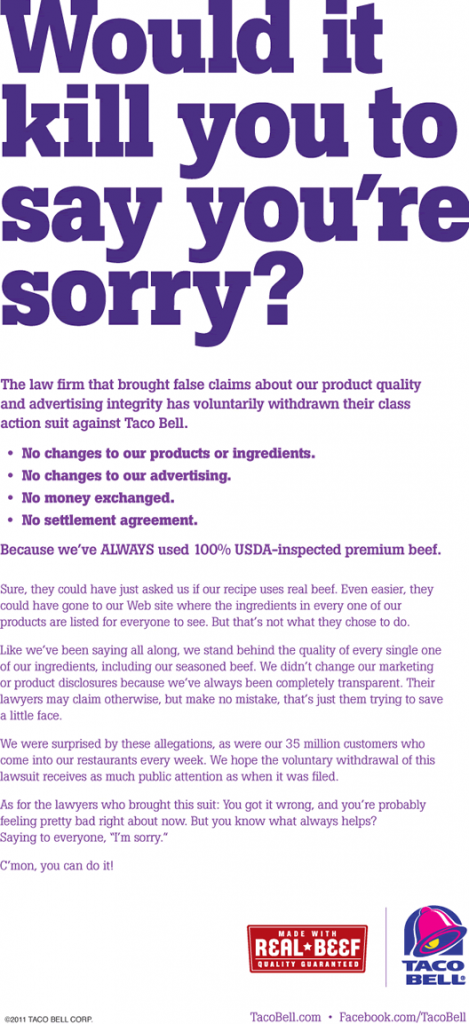
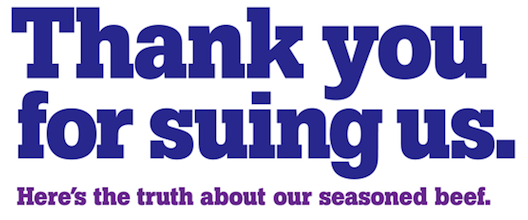
Obamacare: Failure to Launch
In 2013 and 2014, the website for the Affordable Healthcare Act, also known as Obamacare, faced numerous technical difficulties preventing millions from easily signing up for healthcare before the deadline. The inoperative website worried those looking to sign up and critics were quick to denounce the program. The administration released formal statements to quell the worried customers and granted extensions to those whose applications were interrupted by the technical difficulties. They also made it clear that applications via the call center or mail will also be accepted. Additionally, a comically scripted interview was set up with then President Obama and comedian and actor Zach Galifianakis on his show “Between Two Ferns.” The interview not only helped allowed Obama to address the issues with the website with a comical spin, but also allowed him to reach a new audience. Following the 6 minute interview, traffic on the HealthCare.gov website increased by 40%, proving the humorous interview effective.

Kentucky Fried Chicken: FCK
In February of 2018, Kentucky Fried Chicken chains in Britain were forced into closing after running out of chicken. Immediately KFC addressed the issue and apologized to their customers and gave a reason for the chicken shortage rather than pointing blame. The chain had recently switched food distributors and was experiencing communication issues that they planned on addressing. The company set up a website with information on the crisis and opened the page with the line: “The chicken crossed the road, just not to our restaurants…” Additionally, KFC paid for a full-page ad that caught the attention of many for its smart and comical rearrangement of the company’s initials. Simply stating “We’re sorry” followed by a sincere statement effectively helped to pacify customers and earned KFC praise for their creativity and control during this crisis.
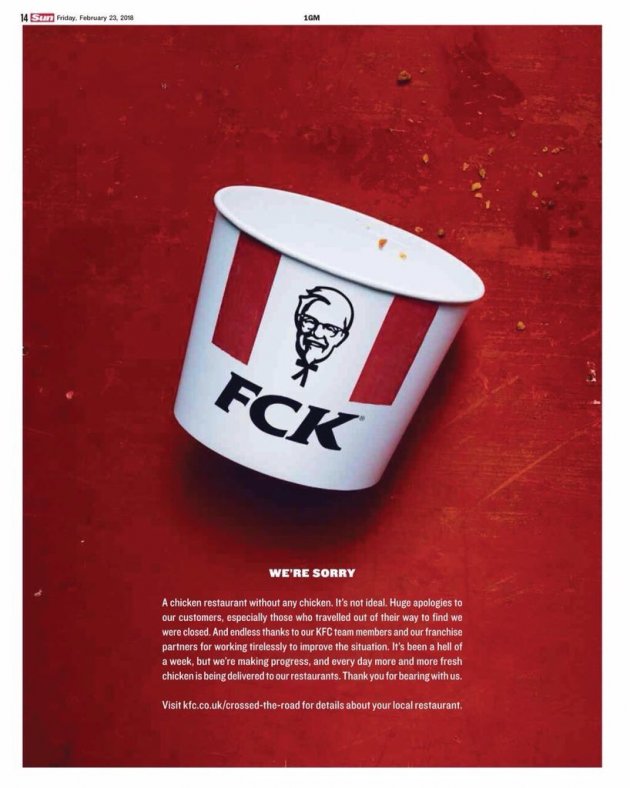
Crock-Pot Slow Cooker: @CrockPotCares
In February 2018 following an episode of popular NBC show, “This is Us,” Crock-Pot
inadvertently found itself in trouble due to the plotline of the show (spoilers ahead). In the episode, the beloved father, Jack Pearson, dies in a fire started by malfunctioning wiring on an old slow cooker. The cooker on the show did not even have the “Crock-Pot” name and still, fans took to Twitter blaming the brand for the fictional death and saying they’d throw away their own Crock-Pots. To respond to the mourning and angry fans, Crock-Pot created the Twitter profile @CrockPotCares and the hashtag #crockpotisinnocent. Additionally, the company sympathized with the “This is Us” fan base in their comments and responses while also stating the facts of their product, reassuring all that a Crock-Pot has never caused a house fire, nor is it actually even capable of doing so. Crock-Pot then followed up by enlisting the help of NBC, which featured “This is Us” actor Milo Ventimiglia on The Ellen DeGeneres Show exclaiming his love for his own Crock-Pot.
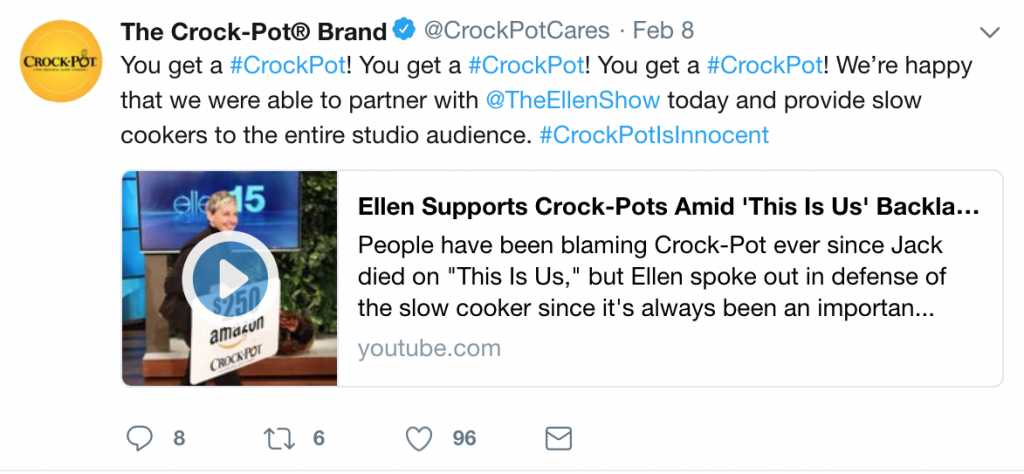
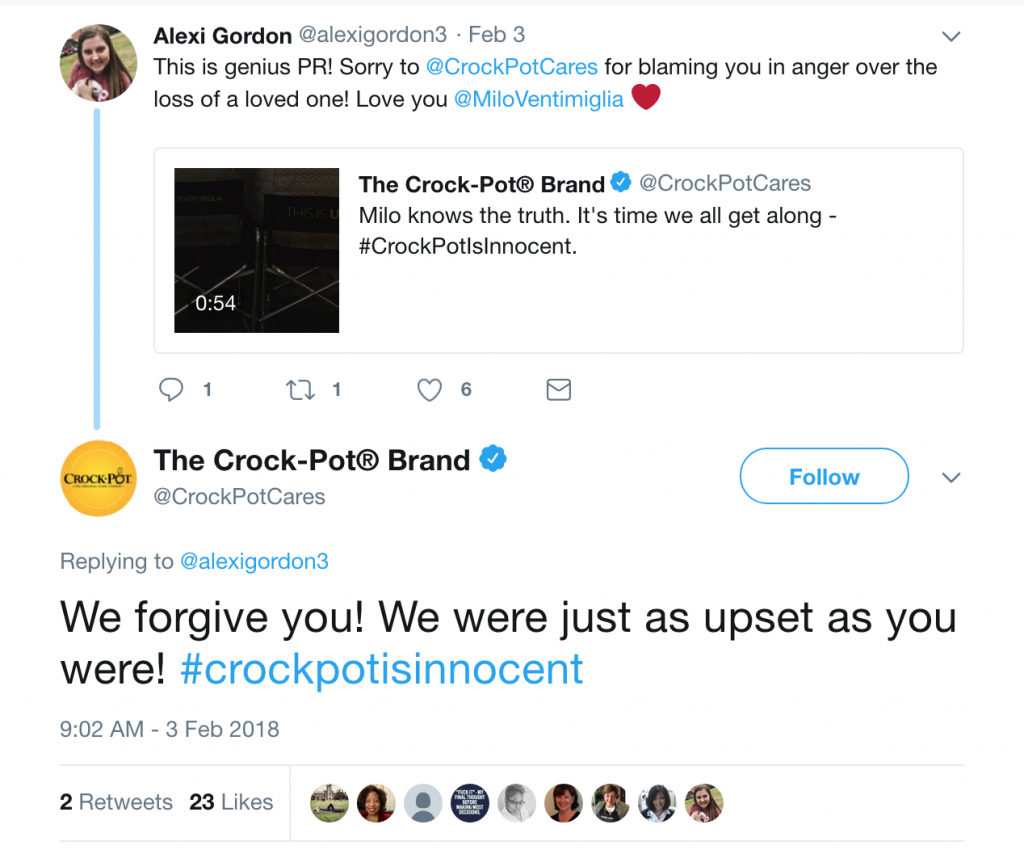
Pepsi: Syringe Hoax
In the summer of 1993, Pepsi was faced with numerous odd reports in which customers reported finding syringes and other objects, such as pins, screws, needles, goo, a bullet, and even a crack vial, in their Diet Pepsi cans. When the report of the first two syringes came in, Pepsi did not recall any products and turned the affected parties to the Alpac Corporation, the bottler. Once the other “findings” were reported and media picked up on these strange occurrences, Pepsi put together a crisis team, investigated their factories, and worked with the FDA. Quickly, they concluded that the cans reported were tampered with and a hoax. Fortunately, a Colorado supermarket security video caught a woman slipping a syringe into a can of Diet Pepsi, largely helping to calm the on-edge public. In response to this crazy hoax and new security footage, Pepsi ran a print ad with a large headline reading: “Pepsi is pleased to announce… nothing.” Sassily telling the world the crisis was much ado about nothing, the company successfully distanced their audience from any fear or negative opinions of the brand.
